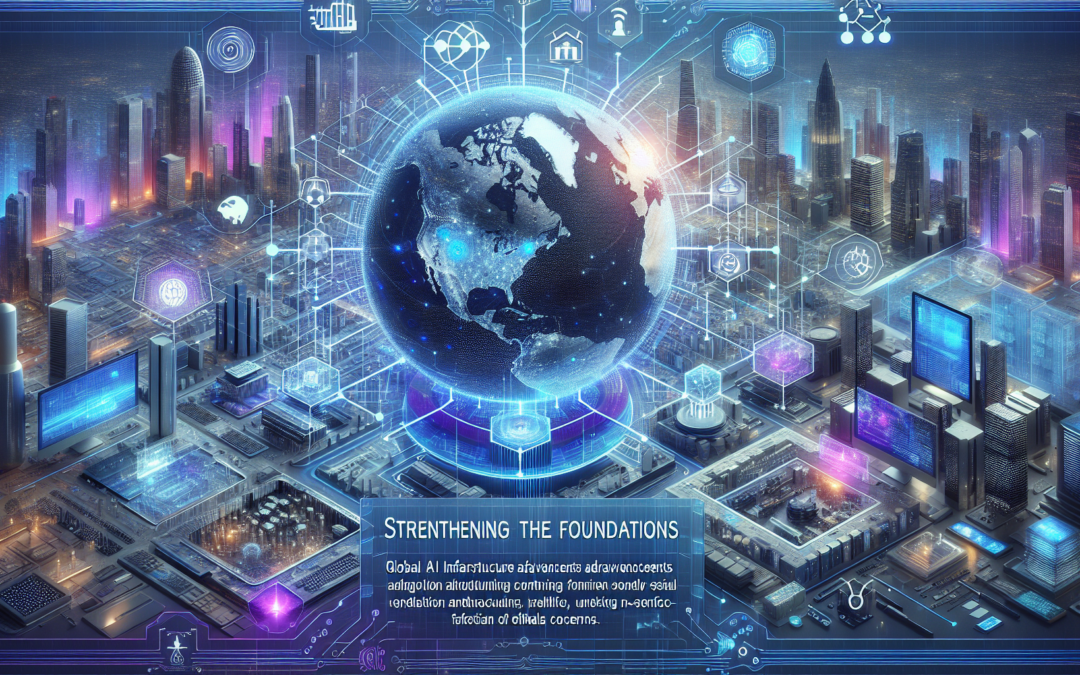“`html
Strengthening the Foundations: Global AI Infrastructure Advancements
In today’s rapidly evolving digital landscape, the race to enhance global AI infrastructure is akin to a modern-day technological gold rush. Recent developments highlight a monumental shift as nations and companies strive to fortify their AI capabilities. A key article discusses these developments in the context of major tech advancements. You can read more about it here.
Key Drivers of Change
The impetus behind the surge in AI infrastructure can be attributed to several factors:
- Increased Data Generation: With the proliferation of IoT devices and digital platforms, the volume of data being generated daily is astronomical. This necessitates robust AI systems for data processing and analysis.
- Economic Competitiveness: Countries are investing heavily in AI to maintain or enhance their standing in the global economy. AI is seen as a strategic asset that can drive innovation across various sectors.
- Technological Advancements: Innovations in machine learning, neural networks, and hardware capabilities have made AI systems more efficient and powerful, enabling more complex applications.
Global Leaders and Their Contributions
As nations ramp up their AI infrastructure investments, notable contributions from major players are evident:
- The United States: Home to tech giants like Google, Microsoft, and IBM, the U.S. remains at the forefront of AI innovation. These companies are leading in developing cutting-edge AI solutions, supported by substantial investment in research and development.
- China: Known for its rapid technological advancement, China has prioritized AI as part of its national strategy. The country is making significant strides with initiatives such as the AI development plan aimed at becoming a global AI leader by 2030.
- The European Union: With its focus on ethical AI, the EU is ensuring that AI deployment is aligned with its regulatory frameworks. Initiatives like “Horizon Europe” emphasize developing AI that adheres to privacy and ethical standards.
Challenges in Implementing AI Infrastructure
Despite the accelerated push towards enhancing AI capabilities, there are significant challenges impeding progress:
- Data Privacy Concerns: The balance between utilizing data for AI development and protecting individual privacy is delicate. Many countries are still grappling with drafting comprehensive policies that align with ethical standards.
- Security Risks: As AI systems become more integral to critical sectors, ensuring their security from malicious actors is paramount. Cybersecurity measures must evolve to counter new AI-specific threats.
- Skill Shortages: The demand for professionals skilled in AI and data sciences far exceeds the available supply. This shortage hinders the pace of AI development and deployment.
Opportunities for Developing Regions
AI infrastructure development is not just a prerogative of developed nations. Emerging economies also stand to gain considerably by investing in AI:
- Boosting Economic Growth: AI has the potential to revolutionize industries such as agriculture, manufacturing, and services, driving productivity and growth.
- Enhancing Public Services: From healthcare to education, AI can improve service delivery efficiency, offering better value to citizens.
- Encouraging Innovation: By investing in AI, developing regions can foster a culture of innovation, attracting foreign investments and collaborations.
Forecasting the Future of AI Infrastructure
As we look ahead, the trajectory of AI infrastructure development is promising yet laden with complexity. The focus will likely be on:
- Building resilient and secure AI systems that can handle increasing data volumes and sophisticated analyses without compromising security.
- Ensuring ethical and responsible AI use remains a central pillar as nations and companies expand their AI capabilities.
- Addressing the talent gap through education and training to create a skilled workforce adept in AI technologies.
The race to enhance global AI infrastructure is not just about technological supremacy; it’s about shaping a future where AI positively impacts all aspects of society. As countries ramp up their efforts, a collective approach that emphasizes collaboration and innovation will be pivotal in realizing the full potential of AI.
With the tide of technology rushing forward, embracing AI responsibly holds the key to unleashing unprecedented benefits for mankind.
“`
